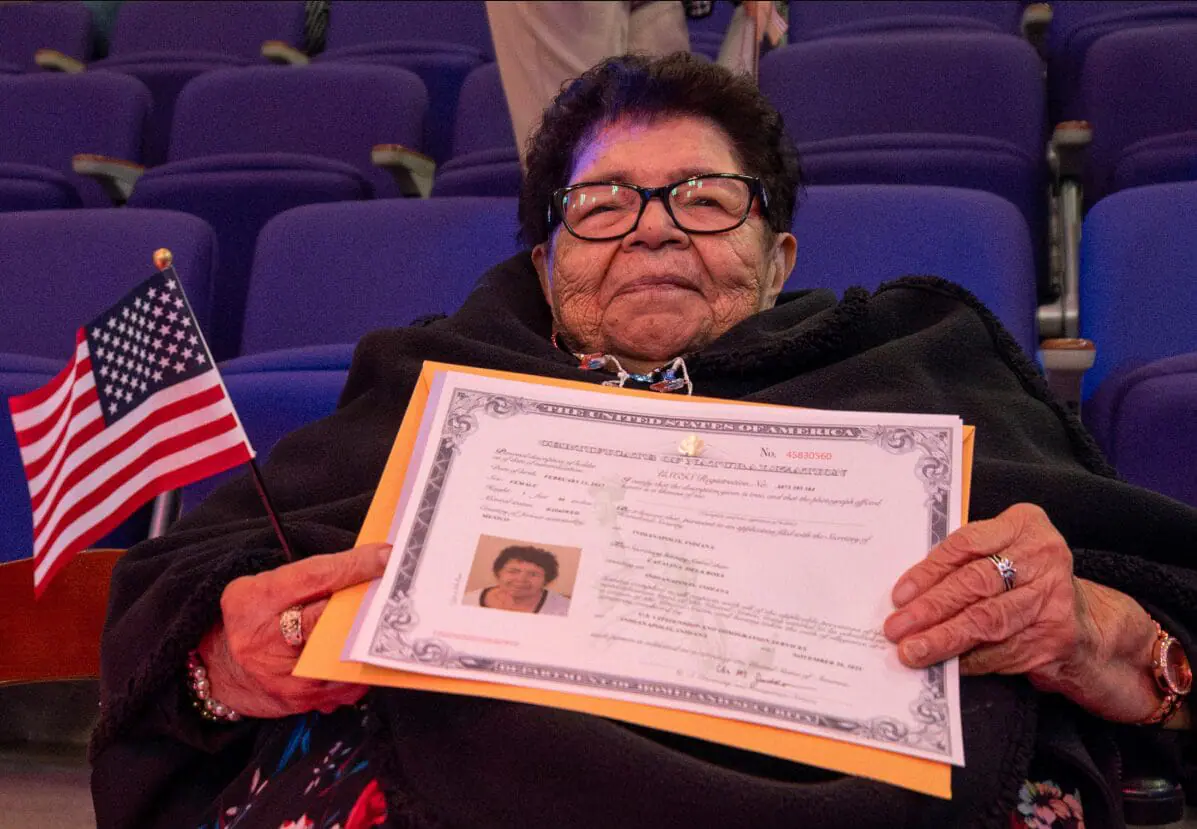‘Her dream came true’: 87-year-old grandmother becomes U.S. citizen
(MIRROR INDY) — The long wait was over for Catalina Dela Rosa.
After spending four decades living in the U.S., the 87-year-old grandmother from Mexico turned in her green card Wednesday and became a U.S. citizen.
She was one of more than 100 immigrants from 32 countries who came to the Central Library on Nov. 20 to forfeit their green cards and visas and become naturalized U.S. citizens.
It wasn’t an easy journey for Dela Rosa. She lost two husbands along the way, but built a family — five children, 11 grandchildren, several great-grandchildren and one great-great grandchild — that will establish roots here for generations.
“Her dream came true,” said Angelica Arteaga, 49, one of Dela Rosa’s five children.
Becoming a U.S. citizen
A long line forms outside Clowes Auditorium at the Central Library as people seeking citizenship wait to receive their papers. After taking their seats, an official with the U.S. Citizenship and Immigration Services Field Office informs them of their civic duty to defend the U.S. Constitution and the laws of the United States of America, and commends them for their “remarkable act of patriotism.”
After reciting a 140-word naturalization oath of allegiance, the ceremony is over. While the pomp and circumstance might be brief, many spent months or years pursuing the naturalization process.

To become a naturalized citizen, immigrants must meet specific requirements including established residency, language proficiency and a citizenship test that one study found only 1 in 3 Americans would pass.
Some immigrants fled civil war ravaged countries like Burma or politically unstable nations like the Democratic Republic of the Congo. Others simply came in search of a better life.
Scarleth Flores, 41, and her family left Honduras when Flores was just 4 years old for “a safer and better future.” She grew up in Miami but decided to move to the Lafayette area 20 years ago for a change of pace and a lower cost of living.
On Nov. 20, Flores, who works for a local trucking company, brought her husband and two of their young children to see their mom become a U.S. citizen. As they watched a line of happy, smiling faces pose for photographs in front of an American flag, the children of course didn’t fully grasp the significance of the event.
“They just know Mom had an important meeting to go to,” Flores said.
Changing attitudes around immigration
Flores is aware that some Americans carry a negative perception toward immigrants, though she says she hasn’t faced any hostility herself. She does remember when the first Trump administration carried out a policy of separating children from their families, which upset her.
“All families should be together, especially with small children,” Flores said. “I’m hopeful that doesn’t happen again.”
Immigration was one of the pivotal issues of November’s election. President-elect Donald Trump has promised to carry out the largest mass deportation in history, and Stephen Miller, one of Trump’s top immigration advisors, has previously called for the mass investigation of naturalized citizens.
In February 2020, the U.S. Department of Justice under the Trump administration created an official section in its immigration office with the ability to strip citizenship rights from naturalized immigrants.
A young widow builds a new life

As for Dela Rosa, she emigrated to the U.S. in 1980, a year after her husband passed away from cancer, leaving behind four young children and a mountain of medical bills.
The young mother found a job working at a sewing factory in California, where she was paid one penny for each article of clothing she fabricated. After three years, she saved up enough money to bring her five children to the U.S.
In 1994, the family rented a U-Haul truck and moved to Indiana for its better cost of living. Dela Rosa would later remarry, though her second husband passed away five years ago.
Her children still hold some memories of life back in Mexico.
As a young girl, Angelica Arteaga remembers her father falling ill in his old age. Her brother, Leonel Arteaga, remembers taking a mule and donkey into the forest to carry firewood to heat their home.
Now with children of their own, the Arteaga family can carry their mother’s legacy for generations to come.
Peter Blanchard covers local government. Reach him at 317-605-4836 or peter.blanchard@mirrorindy.org. Follow him on X @peterlblanchard.
